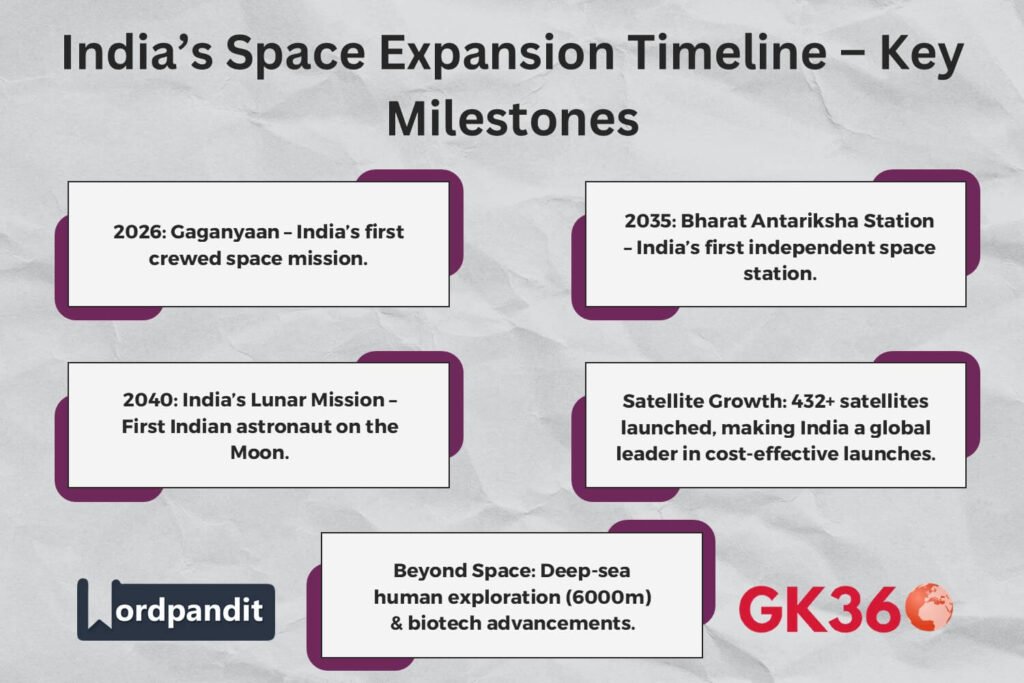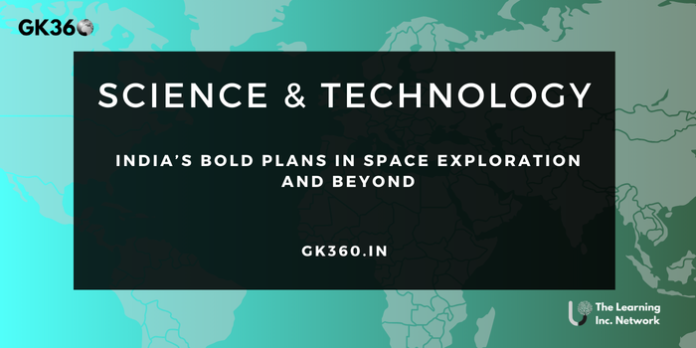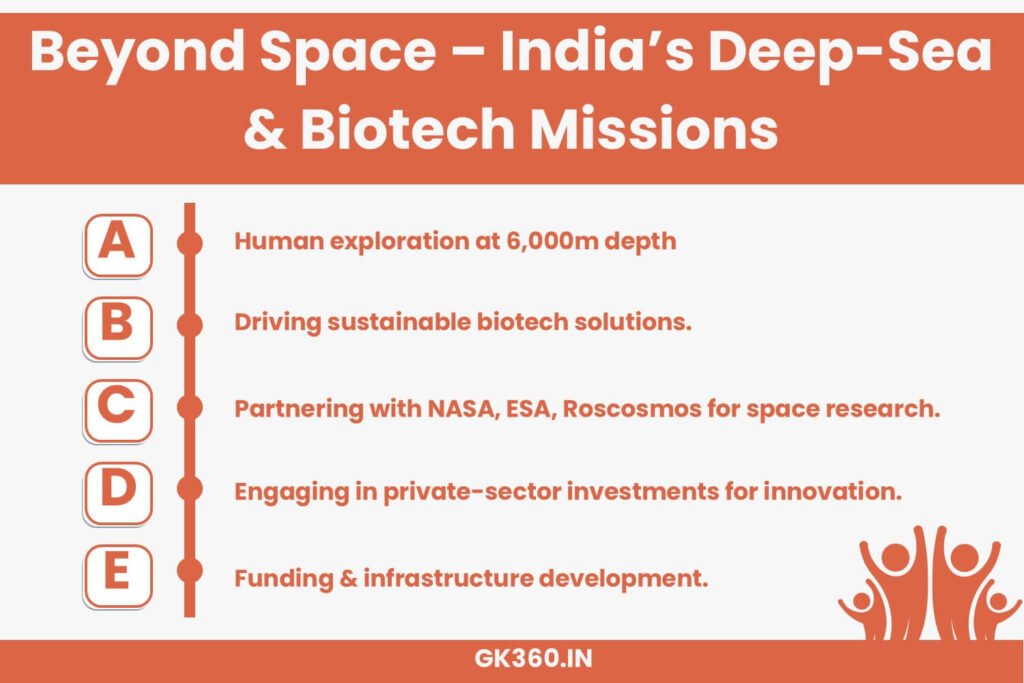India’s Space Exploration Roadmap: Space Station, Moon Mission & Beyond
Introduction
India is rapidly advancing its space exploration ambitions, positioning itself as a global leader in science and technology. With groundbreaking projects such as the Bharat Antariksha Station (India’s first space station by 2035) and a manned mission to the Moon by 2040, the country is taking bold steps toward self-reliance in space. Additionally, missions like Gaganyaan, satellite advancements, deep-sea explorations, and biotechnology innovations further demonstrate India’s commitment to scientific progress.
This article explores India’s roadmap for space exploration, its key missions, challenges, and future prospects.

Table of Contents
- Key Developments in India’s Space Missions
- Human Spaceflight and Satellite Expansion
- Beyond Space: Ocean Exploration & Biotech
- Challenges and Future Outlook
- FAQs
- Conclusion
Key Developments in India’s Space Missions
Bharat Antariksha Station: India’s Space Station by 2035
By 2035, India aims to establish the Bharat Antariksha Station, an independent space station that will place India among an elite group of nations with long-term space research capabilities. This project will:
- Enhance India’s expertise in microgravity research, life sciences, and space technology.
- Foster international collaborations with agencies like NASA, ESA, and Roscosmos.
- Expand commercial opportunities for India’s private space industry.
India’s Lunar Mission: Astronaut on the Moon by 2040
India’s ambitious plan to send an astronaut to the Moon by 2040 signifies its growing capabilities in human spaceflight. This mission will:
- Demonstrate India’s advanced propulsion and landing technologies.
- Expand the nation’s participation in lunar mining and interplanetary exploration.
- Lay the groundwork for future Mars and deep-space missions.
Human Spaceflight and Satellite Expansion
Gaganyaan Mission: India’s First Crewed Space Mission (By 2026)
The Gaganyaan mission is India’s first attempt at human spaceflight, set for launch between 2024 and 2026. Key highlights:
- Three Indian astronauts will orbit Earth for up to seven days.
- Use of indigenous spacecraft developed by ISRO with advanced safety systems.
- A stepping stone for future deep-space crewed missions.
India’s Satellite Launch Achievements (432 Satellites and Counting)
India has launched 432 foreign satellites, with nearly 90% launched in the last decade. The Satish Dhawan Space Centre in Sriharikota has become a major hub for global satellite launches, solidifying India’s reputation as a cost-effective and reliable launch provider.
Beyond Space: Ocean Exploration & Biotech
India’s Deep Sea Mission (6000m Human Exploration)
Beyond space, India is venturing into the depths of the ocean with its Deep Sea Mission. This mission aims to:
- Send humans 6,000 meters underwater to explore deep-sea ecosystems.
- Develop cutting-edge marine technology for resource extraction.
- Support climate research and sustainability initiatives.
Biotechnology E3 Policy (Advancements in Sustainable Growth)
India’s Biotechnology E3 policy is set to revolutionize biotech research by integrating scientific innovation with economic growth. Key areas of focus:
- Sustainable biotech solutions for agriculture and healthcare.
- Employment generation through biotech startups.
- Strengthening India’s global position in biotech research.
Challenges and Future Outlook
Despite these ambitious plans, India faces challenges such as:
- Funding and Infrastructure: High costs associated with long-term space missions.
- Technological Advancements: Need for advanced propulsion systems and space habitats.
- International Collaborations: Strengthening partnerships with global space agencies to share expertise and resources.
FAQs
1. What is India’s Space Station Project?
The Bharat Antariksha Station is India’s planned independent space station, expected to be operational by 2035. It will support long-duration space missions and scientific research.
2. When will India send an astronaut to the Moon?
India aims to send an astronaut to the Moon by 2040 as part of its human spaceflight expansion.
3. How does Gaganyaan compare to NASA’s Artemis program?
While Gaganyaan focuses on low Earth orbit missions, NASA’s Artemis aims for long-term lunar exploration. However, both emphasize advancing human spaceflight technology.
4. What is the significance of the Deep Sea Mission?
India’s Deep Sea Mission will allow human exploration of deep-sea environments, promoting research in marine biodiversity, resource mining, and climate change.
5. How does India plan to fund these space initiatives?
Funding will come from government budgets, private sector investments, and international collaborations. India is also fostering a space economy to boost innovation and commercialization.
Conclusion
India’s ambitious space and deep-sea exploration plans showcase its commitment to scientific innovation and global leadership. With upcoming milestones such as the Bharat Antariksha Station, Gaganyaan, and Moon missions, India is set to redefine its role in the future of space and ocean exploration.
Key Takeaways Table
| Aspect | Details |
|---|---|
| Bharat Antariksha Station (2035) | India’s first independent space station. |
| India’s Lunar Mission (2040) | First Indian astronaut to land on the Moon. |
| Gaganyaan (By 2026) | India’s first crewed mission to space. |
| Satellite Expansion | Over 432 satellites launched, making India a top global launch provider. |
| Deep-Sea Exploration | 6000m human exploration mission for marine research. |
| Biotechnology E3 Policy | Enhancing biotech solutions, startups, and sustainability. |
| Global Collaborations | Engaging with NASA, ESA, Roscosmos, and private investors. |
Related Terms:
- India space station 2035
- India astronaut on the Moon 2040
- Gaganyaan crewed mission 2026
- Bharat Antariksha Station updates
- India deep-sea mission 6000m
- India’s biotechnology E3 policy
- India’s satellite launch growth
- ISRO Moon mission 2040
- India vs NASA space missions
- Future of space exploration India






